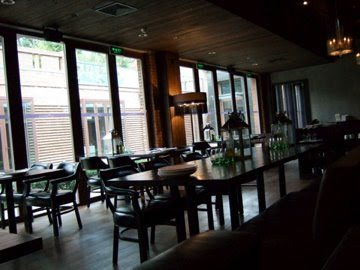


Yesterday my friend and I spent the day in Tianjin, an hour and 10 minute train ride southeast of Beijing.
The train was on time, comfortable and clean, but getting to the Beijing train station was quite the ordeal.
I was expecting to get there by subway but the train passed the station to go to the next one, Chongwenmen. I had to get there by bus which dropped us off almost a block away.
By the time I got to the train station I was sweating like a pig. Oh did I mention it was 34 degrees and probably over 80 percent humidity?
While the train ride to Tianjin was great, we arrived in a smoggy haze in Tianjin. And I'm afraid to report the air quality was worse than Beijing. The air had a strong metallic and gas smell.
And most of the passengers were battling for taxis, while security guards barked instructions on where we should stand for the next available taxi. Welcome to Tianjin, folks.
Then I get into the taxi and it's a female driver with a baseball bat tucked next to her seat, and a metal cage separating us. Looks like it's dangerous in Tianjin too.
I told her where I wanted to go, but she wasn't sure and had to consult her friends via a two-way radio.
I finally made it to the destination, the Tianjin Foreign Studies University where my friend was taking the TOEFL exam.
The grounds of this small campus are very nice. The old colonial architecture is still there, as in the late 1800s, after the second Opium War, parts of the port city were opened up to foreign concessions. Countries like Britain, France, Germany, Russia, Japan and Italy settled here.
And the neighbourhood where this university is located is also called Diwu Da dao, or "the five main streets", where you can see very good examples of European brick architecture.
What's also interesting about Tianjin is that all the streets are named after other places and cities in China. There's Dali Road, Zhejiang Street, Tibet Road, Chongqing Road.
My friend wanted to find a museum that used to be the former residence of an early 20th century Chinese artist. But every taxi driver we encountered had no idea where the place was. And when we asked for suggestions on where to go in Tianjin, our driver didn't have many good suggestions. It was as if they had no civic pride in their city, or anxious to show it off to visitors.
Hungry, we instead headed to the Cultural Street which, we were told, was near Food Street.
However, Cultural Street was more like tourist alley, with every conceivable tacky Chinese souvenir for sale, from fans, to silk pyjamas, Chinese paintings and even feather dusters. And when we tried to find Food Street, we walked and walked finding nothing. We ended up in a mall and ate fast food noodles instead.
After renewing our strength, we came upon another female driver who tried to find that museum again, but no luck. She then suggested we go to the Zhou Enlai Museum, as the revered late premier studied for many years in Tianjin and met his wife there too.
But alas, we arrived five minutes after closing time, at 4:05pm. After taking pictures of the entrance, I suggested we pass by the Tianjin Olympic Center Stadium, where some of the football preliminary matches will be held during the Summer Games.
And it interestingly looks very similar to the National Performing Arts Center, or the Egg in Beijing. Paramilitary troops were practicing their drills in front of the stadium, complete with a German Shepherd panting in the heat.
During our ride, we asked the taxi driver why many of her cohorts were women, as three out of the four drivers we had were female.
She explained that most of them like herself in their late 40s and early 50s were laid-off factory workers. She used to work in a clothing factory, until several years ago. She said after she was a private driver for a company and now drives a cab for a living.
In the end she dropped us off at You Peng Hai Xian, a local seafood restaurant.
As soon as you walk in, you have to choose what seafood you want from the various tanks and tell them how you want it cooked. There were clams and scallops, conchs, various fish, and crabs, as well as meats, vegetables and desserts to chose from.
Then we went upstairs to wait for our dinner.
We had stir-fried clams with chillis that was just a tad undercooked, but the clam meat was juicy and fresh. We also ordered a small crab, boiled with a sauce of vinegar and ginger to dip in. The crab was presented whole on a bed of lettuce.
We wondered how to eat it until we pulled the legs off and then removed the shell and attacked it. Again the crab meat was sweet and fresh.
With a plate of vegetables and bottle of beer, it was delicious. If we hadn't eaten lunch so late we probably would have eaten more seafood, because the bill only came to 127RMB ($18.47).
Fully sated, we headed back to the train station.
My friend talked about going back to Tianjin just for seafood. Sounds like a good idea to me.
That was practically the only good thing about the city.
What a pity.






























